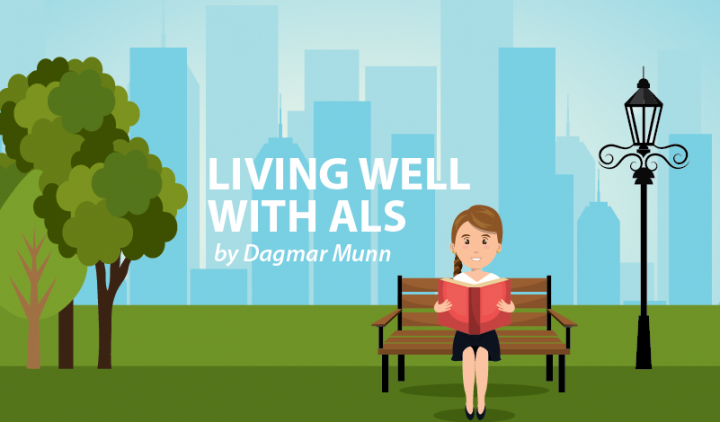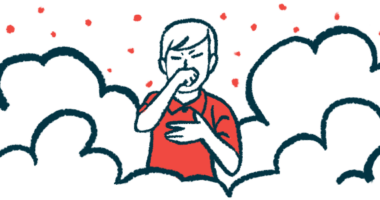3 Things I Would Do Differently If Diagnosed Today

I’m often asked by others in the ALS community for tips and insight from my past 10 years of living with ALS. While I am grateful for both making it this far while maintaining most of my physical abilities, I am by no means an expert.
ALS symptoms differ from person to person; it’s unpredictable, and each of us are on our own journey with the disease.
However, we learn from one another, and I’m always willing to share. So, following are three things I would do differently if I were diagnosed with ALS today:
Adapt to using a rollator much sooner
One of my early ALS symptoms was foot drop. This is a weakness in the lower leg muscles that had me dragging the toe of my shoe with every step I took. In turn, this led to a few nasty falls. Of course, I tried to cover up what was happening by grabbing onto nearby furniture and walls.
Eventually, I decided to use a walking cane. But I still fell. It took the good part of a year before I agreed to use a rollator. Why? Mostly, I was embarrassed. I had the mindset that rollators were for old people, and if I used one my friends would avoid being seen with me.
Looking back, at the very first sign of unsteadiness, I should have transitioned straight into using a rollator and not wasted all those months with a rinky-dink cheap model that was meant for temporary use. I now rely on a bright red, sturdy rollator with big wheels — they can see me coming!
I’ve learned to love my rollator; it helps me walk with better posture, and surprise, surprise: My friends don’t mind at all.
Tell anyone and everyone
Shortly after my doctor told me I had ALS, I knew I needed to share the news with family members and friends. But I hemmed, hawed, and hesitated for many reasons, including confronting the reality of my diagnosis. I knew that when I told others about my ALS it would become real — and I would have to accept that I had ALS.
I had to conquer the gap between diagnosis and acceptance. Plus, I didn’t recognize that my friends and family would be my closest allies. They were eager to offer their support but were confused about what to do.
A decade ago, there were far fewer resources on these topics, and fortunately, that has changed. Now, I recommend the article, “Sharing Your Diagnosis,” from the ALS Association’s Texas Chapter, along with my previous column about helping your friends learn how to help you.
Change the way I exercised
As my muscles weakened, I tried to keep at my traditional exercise routines. But soon I gave in to doing just the “easy stuff.” For example, walking slowly in chest-high water without having to fight gravity felt so good. But it wasn’t helping my body train for the rest of my day — a day filled with gravity.
I had to challenge my muscles with gentle, consistent movement. Now I practice range-of-motion exercises daily, based on fundamental movements taught by the strength and movement specialist company Original Strength. I also do modified yoga, Pilates, and gymnastics moves.
Rather than attempt an hour of exercise and end up exhausted, I spread it out throughout the day. Several preplanned movement breaks help keep my energy up and my mind alert.
We all recognize there are things we would do differently if we could. There are no failures with ALS. The winners are those who’ve been willing to try.
Sure, if I could go back in time, I’d do these three things differently, but I kept going. And I’m willing to help others through my experiences, because I believe that together, we can learn to live well while living with ALS.
***
Note: ALS News Today is strictly a news and information website about the disease. It does not provide medical advice, diagnosis, or treatment. This content is not intended to be a substitute for professional medical advice, diagnosis, or treatment. Always seek the advice of your physician or other qualified health provider with any questions you may have regarding a medical condition. Never disregard professional medical advice or delay in seeking it because of something you have read on this website. The opinions expressed in this column are not those of ALS News Today or its parent company, Bionews, and are intended to spark discussion about issues pertaining to ALS.







james gans
Thank you. That is encouraging for sure. I was diagnosed 4 months ago at age 68 with my right hand losing its strength. Now it's my right arm and hand with some weakness entering my other arm. I am trying to continue with mild exercises including my exercise stair stepper.
Dagmar Munn
Cheers for you, James. I applaud your positive attitude and goal to "keep moving." Perhaps you can find more inspiration in my ALS and Wellness Blog
PERLY REDDISH
My mum suffered from ALS for five years which started with twitching of her toes in her right foot and loosing the strength on her right leg which lead her to dragging it and to frequent falls. In the beginning no one could understand why could she not try to lift her leg or try harder, I guess even her did not understand what is going on as well. With our naivety with what is going on we do not know how to help and support her, we thought she is just not trying and becoming too dependent.. It is sad and it breaks my heart until now, I wish I knew, I wish I understood, but coming from a place where healthcare is only for the rich people, for only who can afford it, we failed my mum. Only now that she is gone I completely understood that it is ALS and what it does to a person. But my mum was great, she tried and she live for us. The laughter did not go away, her memory that is as sharp as a knife, even though we can see her body continuously deteriorating and wasting away.. She tried, for as long as she can. I love her very much, but I know she is with me where ever I go.
Kenneth Menkhaus
Thanks Dagmar, this is very helpful advice, and a good question to ask.
Janet Vickery
This time of year, I am more or less confined to the house. I am so afraid of falling. Been there. Done that. Major fracture of my left ankle. I was diagnosed in 2010. It's considered a slow version. My sister's was aggressive and she was gone within three years. I use a cane, always. I also use a walker and have a wheel chair for appointments, etc. There are things that I can do, opening jars with a rubber sheet I have a scooter for warmer days and pens with grips, for writing. There are good days but there are also bad. One day at a time. Thank you for your words and the fact that some times I feel guilty that my ALS is not faster. To know of some one else who has been around a while after your diagnosis helps.
Nancy
Most appreciative of your positive, helpful outlook & ideas, Dagmar.
I know where to come for a reminder when needed! Your highlighted points which take me to more info on that topic, are a wonderful way of encompassing lots of info in one sitting. Thank you!!
Trish Killian
At my sons house you have to go up 12-15 stairs to get to the main level. We have a metal ramp , but it won’t work for that many steps????
Help I want to visit his family and see my precious grandchildren.
Thank y’all
Dagmar Munn
Hello Trish, you definitely have a challenge - - I found this article containing several helpful suggestions: https://helpandwellness.com/get-wheelchair-up-down-stairs/
Hopefully, it will be of help to you too.
Lee Knezacek
I was diagnosed with ALS a year ago & was told to stop exercises as muscles would deteriorate faster. I am now considered a paraplegic & wish I would have continued movement. My hands & arms are getting weaker. I am concerned that what they told about lack of movement is true. What are your thoughts?
Dagmar Munn
Hello Lee, I'm sorry that your ALS has progressed so fast. I'm not sure why you received medical advice to stop exercising - - there are variations of ALS in which the muscles react negatively to extra movement. However, there has been over 10 years of research showing the benefits of exercise for ALS. The usual course for muscles is to become weak and atrophy as the result of no movement, and, to maintain strength and fitness as the result of moving.
Here’s a brief article explaining a study of strength training slowing down symptoms: https://www.ideafit.com/uncategorized/strength-exercise-may-slow-als-progression/
And the study that was referenced: https://n.neurology.org/content/68/23/2003